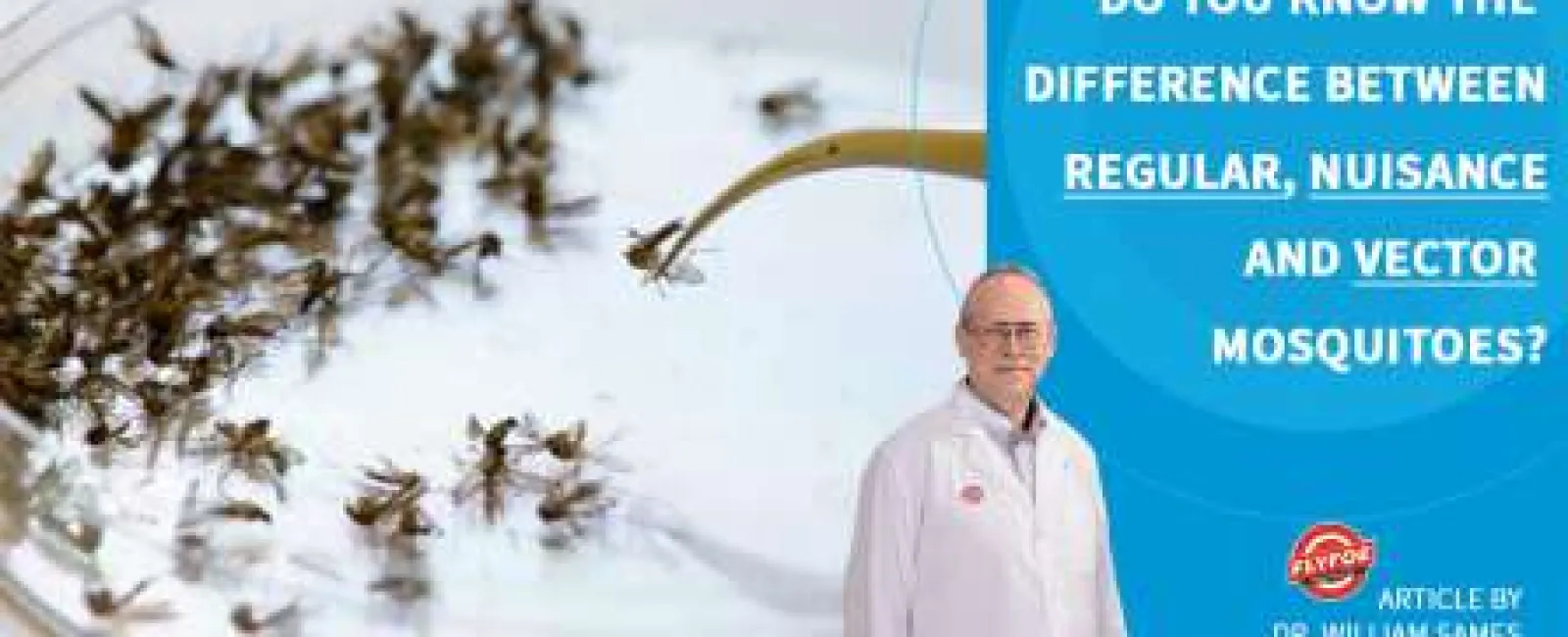There are at least 174 species (types) of mosquitoes in North America and fortunately, not all of them feed on people. Some mosquitoes feed exclusively on birds, reptiles, amphibians, worms, and other animals. For those mosquitoes that do love to feed on humans, mosquito control personnel classify these as nuisance or vector mosquitoes.
Nuisance mosquitoes attack people and make life unpleasant, but thus far, they have not been determined to transfer a mosquito-borne disease.
Vector mosquitoes have the capability of acquiring and transferring at least one type of mosquito-borne disease. This disease transmission is species specific, which means that a vector species does not transmit all mosquito-borne diseases, but only pathogens that can be acquired by the vector and which can survive, replicate, and be retransmitted by the mosquito. For example, the mosquito Culex quinquefasciatus can transmit West Nile virus, but it cannot transmit yellow fever, dengue, chikungunya, Zika, or malaria.
For mosquito-borne disease transmission to take place, 4 things must happen. If one of these is missing, then disease transmission does not happen.
1. The disease agent (pathogen) must be present. This pathogen may be a virus, a malaria parasite, or a filarial nematode.
2. The mosquito vector which can acquire and transmit this pathogen must be present.
3. A person or other animal must have the pathogen in their body and can make it available to the vector. This person or other animal is called the Reservoir.
4. There must be people who can receive the pathogen from the vector and express the disease. These people are called the Susceptible Hosts. Since all 4 of these must happen for disease transmission, the intent is to break this chain of transmission by attacking the pathogen from several directions.
Public Health mosquito control workers attack the vector species and work to keep those numbers low. The lower the vector population, the lower the probability of disease transmission. With few vectors, it is harder for them to find a Reservoir, pick up the disease and transmit it to a Susceptible Host. Whenever a mosquito-borne disease is found, mosquito control personnel treat that area to lower the vector population and hopefully, kill all the vectors that have the pathogen in their body.
Medical personnel such as doctors and nurses help fight mosquito-borne diseases by finding and treating people with the disease in their body. They protect the person from getting fed upon by mosquitoes until the pathogen is gone from that person's body. Medical personnel report mosquito-borne diseases to the Centers for Disease Control, which tracks these diseases and assists states with preventing them from occurring. Veterinarians help protect animals such as dogs (heartworm) and horses (West Nile virus and others) through preventive treatments and vaccines.
Individuals can help prevent and stop mosquito-borne disease transmission by using personal protective measures and by modifying their environment to make it harder for mosquitoes to get to them. Personal protective measures include wearing DEET or other effective mosquito repellents when outside, wearing long pants, long-sleeved shirts, and closed top shoes when mosquitoes are present.
Modifying a person's environment is a little more difficult, but it is necessary in the fight against mosquito-borne disease. Examples are ensuring window screens are in good repair so that mosquitoes cannot fly into their home, finding mosquito habitat in their yard and eliminating that habitat (emptying a plastic bucket of water that has mosquito larvae in it) or protecting it (adding mosquito larvae-eating fish to an ornamental pond, water trough or ensuring that rainwater collection barrels have screens over the entrances to the barrel such that mosquitoes cannot get in or out). Homeowners can also apply a barrier and inner treatment in their yard so that adult mosquitoes trying to hide in shrubbery or out-buildings die when they encounter the treatment.
Most homeowners don't have the time or equipment to apply barrier treatments around their home and this is where Patio Patrol can help.
Patio Patrol personnel can evaluate a yard and make recommendations to help homeowners fight nuisance and vector mosquitoes. Patio Patrol can control larval and adult mosquitoes, and they have the personnel, equipment, supplies, and licenses to apply barrier and inner treatments.
If you are interested in learning more about how Patio Patrol can help protect you, your family, and your pets from nuisance and vector mosquitoes, please visit Patio Patrol
Article by Dr. William Sames, Patio Patrol Entomologist


